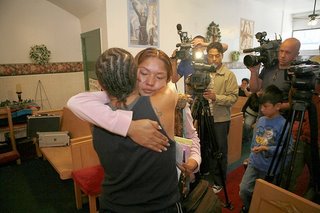 By Oscar Avila
By Oscar Avila
The Chicago Tribune Tuesday 15 August 2006
Taking refuge in a church, a prominent advocate for illegal immigrants publicly defied federal authorities in Chicago who were trying to deport her Tuesday.
Elvira Arellano, who became a national spokeswoman for families facing deportation, had been ordered to report to the Department of Homeland Security by 9 a.m.
Instead, Arellano appeared at the pulpit of Adalberto United Methodist Church in the Humboldt Park neighborhood, vowing before dozens of supporters that she would not return to Mexico "like a coward." She said she would stay in the church indefinitely with her 7-year-old son, a U.S. citizen.
Arellano's move, which apparently took many of her supporters by surprise, recalled the 1980s sanctuary movement, in which many liberal congregations around the U.S. took in illegal immigrants who were fleeing war in Central America.
Her supporters invoked the notion that lawbreakers can be protected in a house of worship, a tradition that dates to the ancient Greeks.
"If Homeland Security chooses to send agents to a holy place, I would know that God wants me to serve as an example of the hatred and hypocrisy of the current administration," Arellano said.
But defying the order also puts Arellano, 31, at risk of even stiffer punishment, including detention.
Because Arellano ignored her deportation order, officials with U.S. Immigration and Customs Enforcement said she is now considered a fugitive. Spokesman Tim Counts said agents have the authority to go into a church or anywhere else to make an arrest.
"We will take action at the time and place of our choosing," Counts said.
Legal experts agree that a church offers no formal protection, but they say it could put the government in an awkward position.
"Just because you are in a church doesn't mean you are less deportable in a legal sense," said Joel Fetzer, associate professor of political science at Pepperdine University. "But in a political sense, it looks very bad to be hauling people out of churches as the camera rolls."
Arellano, a cleaning woman at O'Hare International Airport, was arrested in 2002 during an immigration sweep aimed at securing the nation's aviation system after the Sept. 11, 2001, attacks. Authorities discovered she had been using a fake Social Security number to work and had previously been deported and re-entered the country illegally.
U.S. Sen. Dick Durbin (D-Ill.) and other members of the state's congressional delegation urged homeland security officials to let Arellano remain in Chicago to care for her son, Saul, born in the U.S., who has ADHD and other health problems. She was granted three stays of deportation starting in 2003.
No longer in hiding, she began to speak openly about her own experiences and became a symbol for the state's 400,000 illegal immigrants.
She took her case to Mexico President Vicente Fox and to the Statehouse in Springfield. She helped found and became president of United Latino Family, a Pilsen-based group that lobbies for families that could be split by deportation.
But some of those sympathetic to her cause, including Durbin, suggested that another stay of deportation would be harder to justify because her son's condition has improved. Immigration officials say that without a U.S. senator's request, they cannot grant such a stay.
"It is an unfortunate truth that scores of people are in the same situation as Elvira and her family," Durbin said in a statement Tuesday. "We cannot fix the injustices of this system with private bills. Only comprehensive immigration reform can permanently remedy this situation."
Now Arellano says her only option is to seek sanctuary.
In a 2003 article in a Harvard Law School journal, law professor Wayne Logan recounted how the Greeks and Romans offered limited protections to criminals who sought shelter in temples. In the 10th Century, England's civil authorities designated sanctuaries marked by a series of crosses, Logan said.
But the tradition faded, and these days, those who invoke sanctuary typically do so as a form of civil disobedience.
When churches and synagogues harbored illegal immigrants fleeing civil war in El Salvador and Guatemala in the 1980s, U.S. authorities charged and convicted several ministers. The U.S. Supreme Court in 1987 upheld the arrests, saying they did not violate freedom of religion.
But some religious leaders have said recently they are not bound to follow tough immigration laws they consider immoral. In March, Cardinal Roger Mahony in Los Angeles said he would urge priests to ignore a proposed federal law that would increase criminal penalties against those who assist illegal immigrants.
Fetzer, who has researched sanctuary movements, said that as more people face deportation, some may choose to follow Arellano's example.
Carlina Tapia-Ruano, a Chicago immigration attorney, said the defiance might make homeland security officials more determined to take action so they aren't viewed as soft on illegal immigration.
"Any attention given to this case makes the next step unpredictable, whether it is by the agency or whether it is by Elvira," said Tapia-Ruano, president of the American Immigration Lawyers Association.
Arellano's supporters say that if agents do try to make an arrest at the church, they want it to be a chaotic scene, much like the 2000 raid in which federal agents seized 6-year-old Elian Gonzalez to return him to his father in Cuba.
As her backers offered hugs and kind words, Arellano said she is prepared to pay the consequences of defying the U.S. government.
"If I have to spend 10 or 20 years in jail, I don't care," Arellano insisted. "Because I am going to fight."
 Low Rider Vehicles on Parade
Low Rider Vehicles on Parade





